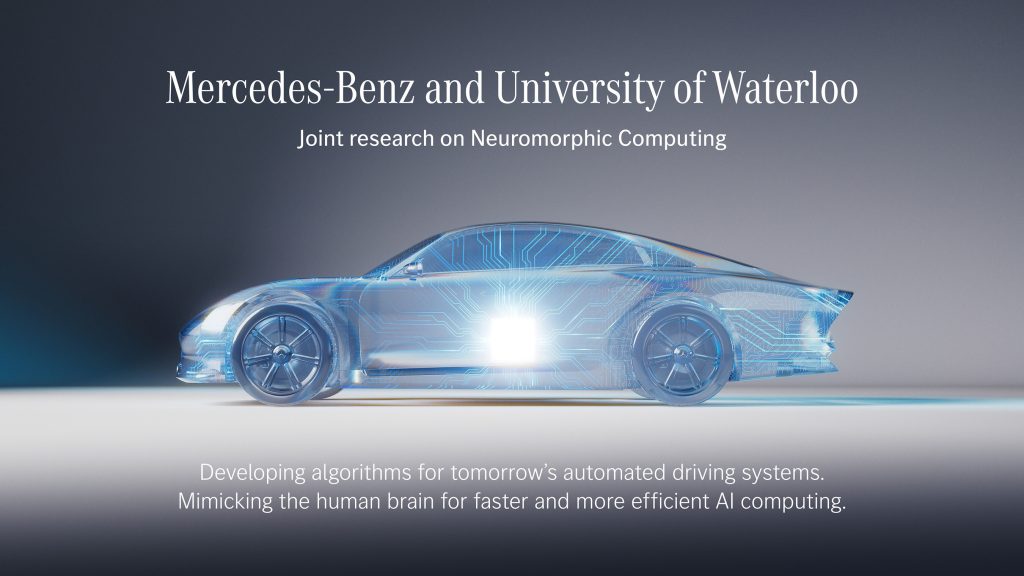- Mercedes-Benz and the Ontario government, through the Ontario Vehicle Innovation Network (OVIN), establish incubators to foster startup creation, startup scouting and automotive innovation in Ontario, Canada
- OVIN Incubators join growing international Mercedes-Benz STARTUP AUTOBAHN network
- Initiative aims to drive transfer to industrialization, leveraging the region’s strong foundation in advanced automotive technology and smart mobility
- Research collaboration with University of Waterloo complements existing academic research into neuromorphic computing
STUTTGART, Germany and TORONTO, Oct. 8, 2024 /CNW/ – Mercedes-Benz is partnering with the Ontario Vehicle Innovation Network (OVIN), the Government of Ontario’s flagship initiative for the automotive and mobility sector. The purpose is to expand startup creation and scouting activities in North America and to promote the commercialization of automotive innovation. The OVIN Incubators Program will focus on identifying and fostering innovation in future software & AI, future vehicle components and future electric drive. Working with startups, and in partnership with OVIN, Mercedes-Benz will help progress promising projects through the provision of its specialist expertise and use cases. Selected projects will also benefit from the international Mercedes-Benz STARTUP AUTOBAHN network. Separately, the company intends to start a research collaboration with the University of Waterloo, Ontario with a focus on neuromorphic computing for automated driving applications. The move complements a range of ongoing Mercedes-Benz R&D activities in Canada.

“Innovation is part of Mercedes-Benz DNA. In our global R&D strategy, open innovation gives us rapid and direct access to the latest ideas and developments around the world. We are therefore delighted to further expand our activities in Canada as a founding partner of the OVIN Incubators. In a fast-paced environment, it is another important channel for developing exciting future products and elevating our customer experience through new technologies.”
Markus Schäfer, Member of the Board of Management of Mercedes-Benz Group AG, Chief Technology Officer, Development & Procurement
The academic research collaboration and participation in the OVIN Incubators Program are the latest in a series of initiatives underpinned by the company’s Memorandum of Understanding (MoU) with the government of Canada, signed in 2022. The aim of the MoU is to strengthen cooperation across the electric vehicle value chain. Through the partnership with the Ontario government through OVIN, Mercedes-Benz is accelerating and expanding its presence by tapping into Ontario’s international acclaim as a centre for tech development, recognizing the province’s significance for Mercedes-Benz’s global innovation network.
Open innovation draws in ideas, inspiration and technologies from a wide variety of external sources and partners. This approach is a long-established part of Mercedes-Benz R&D strategy, enriching and complementing the company’s internal R&D work worldwide.
“This new partnership between the Ontario Vehicle Innovation Network (OVIN) and Mercedes‑Benz is going to be a significant boost for our province’s automotive and mobility sectors. By bringing together the best of industry, research, and entrepreneurial talent, we’re fostering innovation that will strengthen our economy, create good jobs and position Ontario as a leader in the auto and electric vehicle technologies of the future.”
Doug Ford, Premier of Ontario
“Ontario continues to build its reputation as a world leader in manufacturing the cars of the future, with $44 billion in new investments by automakers, EV battery manufacturers and parts suppliers coming into the province over the last four years. The launch of OVIN Incubators represents another link in our growing end-to-end, fully integrated, EV supply chain. With a new platform for our world-class tech ecosystem to develop homegrown mobility innovations, Ontario talent will continue to be on the forefront of creating the technologies that will power vehicles all over the world through the Mercedes-Benz STARTUP AUTOBAHN network.”
Vic Fedeli, Ontario Minister of Economic Development, Job Creation and Trade

“As Ontario sets its sights on the next decade of growth of its automotive and mobility sector, it is vital that we continue to foster the talent, technical expertise and capacity for innovation to achieve this future. The OVIN Incubators build a robust foundation for nurturing the next generation of innovators by providing a clear pathway from research and development to commercialization and industrialization, in partnership with Ontario’s leading postsecondary institutions and major industry players. This platform will further cement the foundation for sustainable economic growth within the sector and beyond, across the entire province.”
Raed Kadri, Head of OVIN
Mercedes-Benz partners in OVIN Incubators to accelerate startup scouting and support commercialization
In its pilot phase, the OVIN Incubators Program will conduct startup scouting to identify opportunities in Ontario relevant to Mercedes-Benz fields of research. The aim is to empower startups to engage with industry and establish a robust pipeline of companies whose growth can be catalyzed. Together, OVIN and Mercedes‑Benz will narrow down an initial longlist through a process of evaluation, ultimately arriving at individual projects that will progress to proof-of-concept based on Mercedes‑Benz use cases. The OVIN Incubators join a growing international network of regional programmes benefitting from the Mercedes‑Benz STARTUP AUTOBAHN platform for open innovation. This globally networked and locally executed approach seeks to maximize the pool of ideas, innovations and technologies that can flow into future Mercedes‑Benz products. Looking to the future, the next phase of the OVIN Incubators will seek to expand its scope through the addition of further partners from industry and academia.
Collaboration with the University of Waterloo to help seed, grow and harvest research in the field of neuromorphic computing
Mercedes-Benz and the University of Waterloo have signed a Memorandum of Understanding to collaborate on research led by Prof. Chris Eliasmith in the field of neuromorphic computing. The focus is on the development of algorithms for advanced driving assistance systems. By mimicking the functionality of the human brain, neuromorphic computing could significantly improve AI computation, making it faster and more energy efficient. While preserving vehicle range, safety systems could, for example, detect traffic signs, lanes and objects much better, even in poor visibility, and react faster. Neuromorphic computing has the potential to reduce the energy required to process data for autonomous driving by 90 percent compared to current systems.
“Industry collaboration is at the heart of our success as Canada’s largest engineering school. We recognize that research partnerships with companies such as Mercedes-Benz bring opportunities to directly apply and test our work, while introducing our students to the highest standards in industry.”
Mary Wells, Dean, Faculty of Engineering at the University of Waterloo
The work with the University of Waterloo complements a series of existing Mercedes‑Benz research collaborations on neuromorphic computing. One focus is on neuromorphic end-to-end learning for autonomous driving. To realize the full potential of neuromorphic computing, Mercedes‑Benz is building up a network of universities and research partnerships. The company is, for example, consortium leader in the NAOMI4Radar project funded by the German Federal Ministry for Economic Affairs and Climate Action. Here, the company is working with partners to assess how neuromorphic computing can be used to optimize the processing of radar data in automated driving systems. In addition, Mercedes‑Benz has been cooperating with Karlsruhe University of Applied Sciences. This work centres on neuromorphic cameras, also known as event-based cameras.




